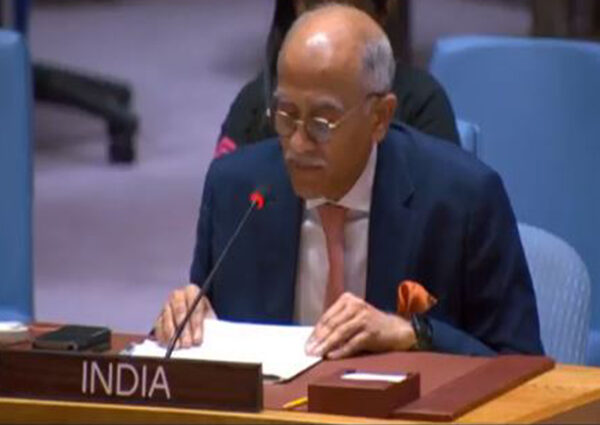
India Rebuts Pakistan’s Disinformation On Indus Water Treaty At UNSC
India, in a firm and unequivocal statement at the United Nations Security Council (UNSC), accused Pakistan of spreading disinformation over the Indus Water Treaty and reiterated its commitment to responsible water management even amid persistent cross-border terrorism.
Delivering the statement at the Arria Formula Meeting on “Protecting Water in Armed Conflict – Protecting Civilian Lives”, Permanent Representative of India to the United Nations Parvathaneni Harish strongly refuted Pakistan’s claims regarding the Indus Water Treaty.
Harish highlighted Pakistan’s violation of the treaty’s spirit through its support for cross-border terrorism and its obstructionist approach to modifying the treaty.
Harish affirmed that India has always acted responsibly as an upper riparian state and accused Pakistan of distorting facts. “India entered into the Indus Water Treaty 65 years ago in good faith,” he said, recalling that the agreement was signed in a spirit of goodwill and friendship.
He pointed out that Pakistan has violated the treaty’s spirit by inflicting three wars and thousands of terror attacks on India, resulting in over 20,000 Indian lives lost in the last four decades.
“Pakistan has violated the spirit of the treaty by inflicting three wars and thousands of terror attacks on India. In the last four decades, more than 20,000 Indian lives have been lost in terror attacks, the most recent of which was a dastardly targeted terror attack on tourists in Pahalgam last month. India has shown extraordinary patience and magnanimity throughout this period. Pakistan’s state-sponsored cross-border terrorism in India seeks to hold hostage the lives of civilians, religious harmony, and economic prosperity,” he added.
He added that Pakistan’s state-sponsored terrorism threatens civilian lives, religious harmony, and economic prosperity.
He emphasized that significant changes have taken place in the past 65 years, including escalating security concerns, growing requirements for clean energy, climate change, and demographic shifts.
“In these 65 years, far-reaching fundamental changes have taken place not only in terms of escalating security concerns through cross-border terror attacks, but also growing requirements for producing clean energy, climate change, and demographic change. Technology for dam infrastructure has transformed to ensure safety and efficiency of operations and water use. Some of the old dams are facing serious safety concerns,” he added.
“Some old dams face serious safety concerns,” he said, pointing out that terrorists even attacked the Tulbul Navigation Project in Jammu and Kashmir in 2012.
“In fact, in 2012, terrorists even attacked the Tulbul Navigation Project in Jammu and Kashmir. These cynical acts continue to endanger safety of our projects and lives of civilians,” added Permanent Representative of India to the United Nations.
Harish stated that India has formally asked Pakistan to discuss modifications to the treaty, but Pakistan has continued to block consistently any changes to this infrastructure and any modifications of the provisions which is permissible under the treaty.
“Against this backdrop, India has finally announced that the treaty will be in abeyance until Pakistan- a global epicentre of terror credibly and irrevocably ends its support for cross-border terrorism,” he stated.
India has formally asked Pakistan to discuss the modifications of the treaty on several occasions in the past two years. However, Pakistan continues to reject these and Pakistan’s obstructionist approach continues to prevent the exercise of full utilisation of the legitimate rights by India.
“It is clear that it is Pakistan which remains in violation of the Indus Water Treaty,” Harish concluded.
India suspended the Indus Waters Treaty in April 2025, following the Pahalgam terror attack, which it blamed on Pakistan-based terrorists. (ANI)



